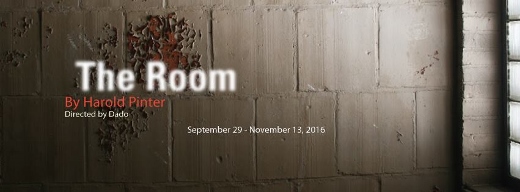
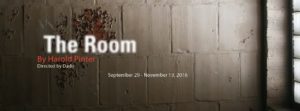 Recommended ****To watch “The Room” , directed by Dado at A Red Orchid, gives one a sense of how unnerved the original audience must have felt when Harold Pinter’s first play debuted in 1957. Written in less than a week, this highly ambiguous drama about psychological isolation, apparently told from the point of view of a mentally ill woman, foreshadowed Pinter’s break-out The Birthday Party less than a year later, as well as The Hothouse, which Dado directed for A Red Orchid ten years ago. In The Room, audiences can see Pinter’s first efforts to explore how language can lack or obscure meaning, but the production is by no means an intellectual exercise meant only for theatre scholars. Dado’s brilliant ensemble and design team make the closed-off section of mid-last-century working-class London utterly engulfing, and for seventy minutes, audiences are absorbed in a dangerous, absurd world.
Recommended ****To watch “The Room” , directed by Dado at A Red Orchid, gives one a sense of how unnerved the original audience must have felt when Harold Pinter’s first play debuted in 1957. Written in less than a week, this highly ambiguous drama about psychological isolation, apparently told from the point of view of a mentally ill woman, foreshadowed Pinter’s break-out The Birthday Party less than a year later, as well as The Hothouse, which Dado directed for A Red Orchid ten years ago. In The Room, audiences can see Pinter’s first efforts to explore how language can lack or obscure meaning, but the production is by no means an intellectual exercise meant only for theatre scholars. Dado’s brilliant ensemble and design team make the closed-off section of mid-last-century working-class London utterly engulfing, and for seventy minutes, audiences are absorbed in a dangerous, absurd world.
Rose (Kirsten Fitzgerald) rents some rooms in a large, decaying old house along with her husband, Bert (H.B. Ward). To call him distant would be a massive understatement; for most of the play, he doesn’t acknowledge her at all. As for Rose, to say she babbles would be to imply that she speaks far more than she does, and yet, when she does break up her pauses, it is only to repeat the same inane worries about how cold the night-air is, how strange whoever is renting the basement must be (if there is anyone there at all), and wouldn’t Bert please stay in tonight, since it’s so cold out? Despite spending a great deal of time cooking his dinner and ostensibly intending her words for him, the way Fitzgerald plays her, Rose only seems to be expect a response from Bert once. Perhaps she’s used to him ignoring her. If that’s what he’s doing, the set, designed by Grant Sabin, offers a clue why. While otherwise being a realistic tin-roofed representation of an old-style interior, it is absolutely covered in potatoes, some of which have gotten into the strangest of places. Fitzgerald’s program note states that she sees Rose as a recluse; clearly, she is a hoarder, as well.
When the landlord, Mr. Kid (Anish Jethmalani), enters to inspect the pipes, Rose has a conversation with him that could almost be normal, were it not for his confusion over basic facts such as how many floors his building has or whether his mother was Jewish. The characters’ xenophobia and discomfort with minorities is a recurring point of conversation, but Rose manages to hold her anxiety together until she is left alone. After that, the lights start flickering, the strange sounds from the basement get louder (designers Claire Chzran and Heath Hays did outstanding work communicating Rose’s sensory experience), and when she is interrupted by an incredibly rude house-hunting couple (Dano Duran and Mierka Gierten), they seem to have some of the physical characteristics of birds. (Kotryna Hilko’s costumes are simultaneously amusing and menacing). Then, the play becomes violent; but Rose remains incapable of understanding the reasons for anything that appears to be happening around her, and ends up declaring that she “can’t see.”
While the other actors (Jo Jo Brown rounds out the cast) play characters with an exaggerated bent, Fitzgerald’s performance is steady and convincing. Rose has accepted a great many odd physical phenomena as normal, while maintaining ordinary concerns about respectability and coddling her indifferent husband. She allows Mr. Kid to throw potato scraps on her floor, but is horrified at the idea of a stranger taking liberties with her. I once lived in an apartment with a radiator which made a sound my neighbor described as akin to a person trying to break out of a metal cage with an ax, so I understand how people become inured to the strange quirks of suboptimal living spaces. But Pinter was interested in how little absurdities, annoyances, and uncertainties pile up in an unstable mind until they cause a crises.
That’s one reading, anyway; much has been written about Kafka and Beckett’s influence on Pinter, but in the long, silent kitchen scenes that are reminiscent of Miss Julie and the fixation on a toxic domestic living space that recalls scenes from A Dream Play and The Pelican, I see the influence of August Strindberg, whose work chronicled his lifelong struggle with mental illness. Certainly, Pinter could create a mood with language which causes one to doubt one’s own senses and recollection, and Dado has created the perfect physical manifestation of this feeling at A Red Orchid’s intimate space. The Room isn’t a night of light entertainment, and Pinter himself must have seen things in it he could improve upon, since he rapidly produced other, very similar plays which have achieved greater fame. But The Room is fascinating in its own right in addition to being a piece of history, is seasonally appropriate, and at A Red Orchid, very strong in performance.
The Room will continue at A Red Orchid Theatre at 1531 N Wells St through November 13. Performances are as follows:
Fridays 8:00 p.m.
Saturdays 8:00 p.m.
Sundays 3:00 p.m.
Tickets are $30-35; to order, call 312-943-8722 or visit aredorchidtheatre.org. This show’s running time is about seventy minutes.
To see what others are saying, visit www.theatreinchicago.com, go to Review Round-Up and click at “The Room.”

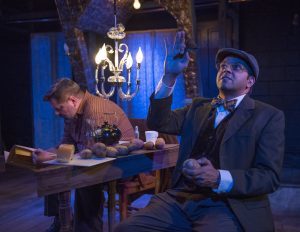
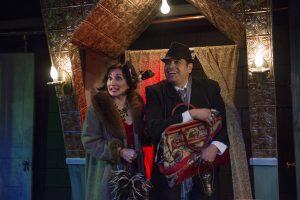



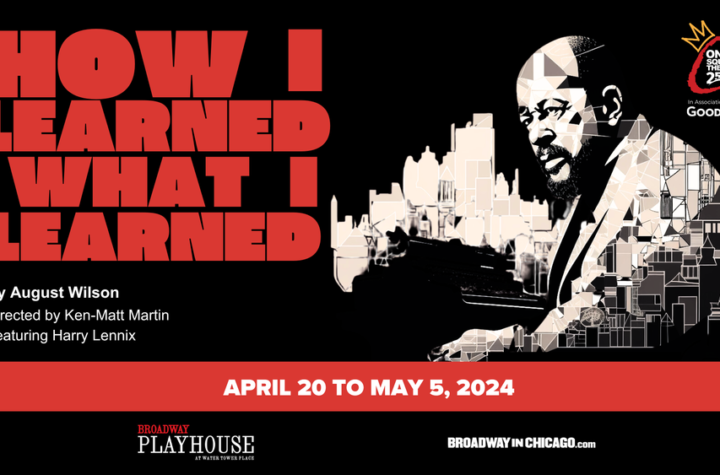

More Stories
“Joe Turner’s Come and Gone”
“How I Learned What I Learned” reviewed by Julia W. Rath
“How to Know the Wild Flowers: A Map” reviewed by Julia W. Rath